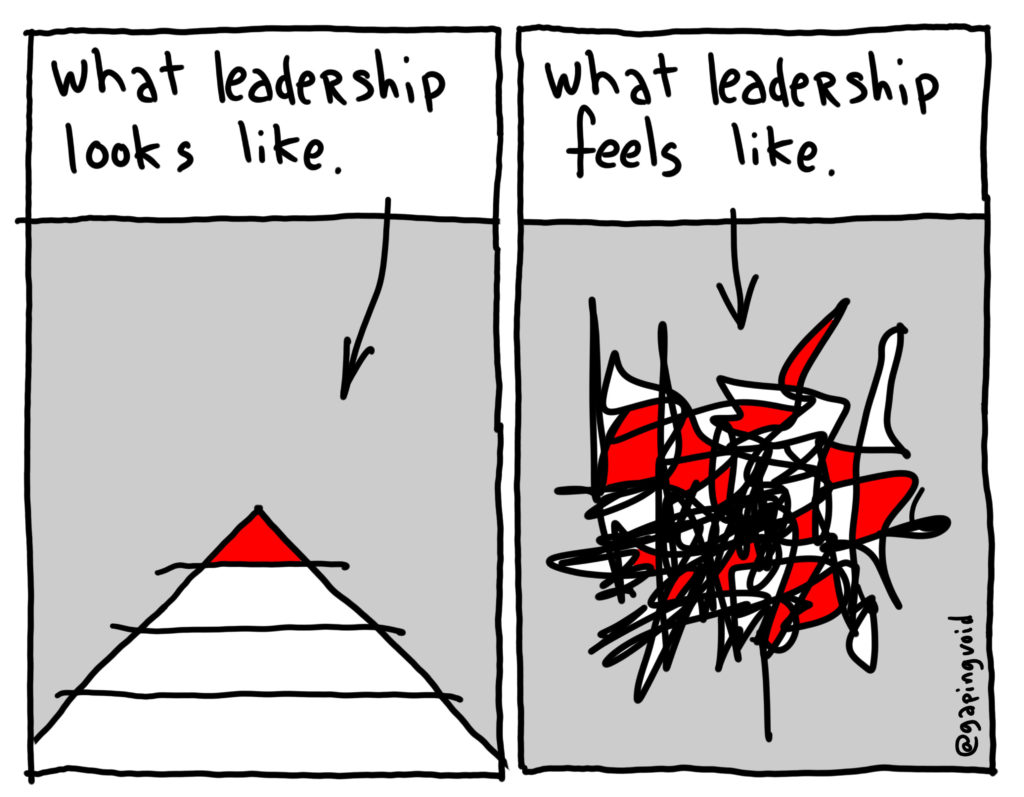
In renowned psychologist Alison Gopnik’s must-read book, The Gardener and the Carpenter, she makes a seemingly too obvious statement: “Children are messy.”
It’s not a new or radical thought, but sometimes we don’t need to be taught something new as much as simply reminded of something important but perhaps out of mind.
My two-year-old grandson, Benjamin, recently had a meltdown in a nice restaurant. Yep, children are messy. He drew a nice picture of a house, dog, and moon—on the wall of our hallway. Yep, children are messy. I could go on ad infinitum, but you get my drift.
When these mishaps occur, reminding myself that “children are messy” seems to help me deal with them. Perhaps just anticipating that unfortunate things will happen ameliorates the discomfort.
Now, let’s switch applications. Here’s a reminder to leaders: leadership is messy.
- No matter how conscientious you are about hiring good people, you’ll make mistakes.
- Well-thought-out strategies that you consider bulletproof will sometimes fail.
- Earn a black belt in internal communications, but you’ll still have embarrassing moments of confusion and misalignment in your organization.
- Even though you carefully negotiate dismissing an under-performing staff member, you still might get sued.
Work hard at leading well, but don’t be surprised or overly discouraged when things fall apart or get messy. Don’t be cavalier about breakdowns, but don’t let them disrupt your confidence or determination.
The constant challenges that leaders face may cause you to rethink being one. You may be happier and more fulfilled in a non-leadership role—functioning as an achiever rather than a leader. There’s nothing wrong with that.
Raising children and leading an organization have one thing in common: both are messy.
Here’s a video of a smart leader responding to a difficult situation.
[youtube id=”5L8Em5vU0FU”]
[reminder]What are your thoughts about this essay?[/reminder]
[callout]12 best books I read last year – book 3 of 12
The Road to Character – David Brooks
A great treatise on character illustrated by a brief biography of major characters (Eisenhower, Augustine, Dorothy Day, George Eliot, and others). Click here for more information from Amazon.[/callout]

 In a 50/50 relationship—where each person has equal authority—a “no” is more powerful than a “yes.” For instance, in a marriage in which the 50/50 rule is in place, if one spouse says, “Let’s go out to eat on Friday,” and the other says, “No; I don’t want to,” the latter rules. “No” trumps “yes.”
In a 50/50 relationship—where each person has equal authority—a “no” is more powerful than a “yes.” For instance, in a marriage in which the 50/50 rule is in place, if one spouse says, “Let’s go out to eat on Friday,” and the other says, “No; I don’t want to,” the latter rules. “No” trumps “yes.” At work and at home, conflicts are inevitable. We are imperfect people living in an imperfect world. So don’t be surprised when relationships are strained, but do proactively try to resolve the conflicts.
At work and at home, conflicts are inevitable. We are imperfect people living in an imperfect world. So don’t be surprised when relationships are strained, but do proactively try to resolve the conflicts. Last summer, I boarded a flight from Dallas/Ft. Worth to Seattle. I had priority boarding so I was among the first passengers on the plane. Normally this is a good thing but not in this instance because the plane was stiflingly hot.
Last summer, I boarded a flight from Dallas/Ft. Worth to Seattle. I had priority boarding so I was among the first passengers on the plane. Normally this is a good thing but not in this instance because the plane was stiflingly hot.